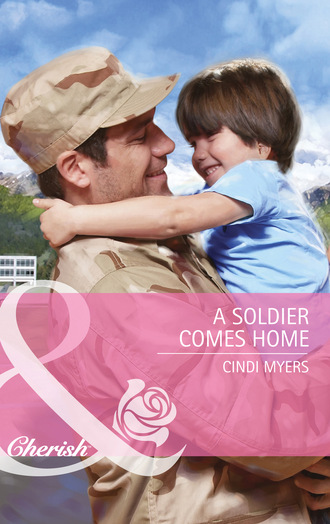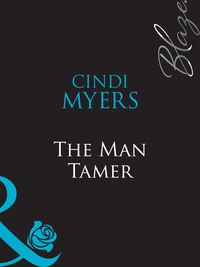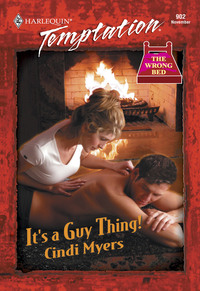
Полная версия
A Soldier Comes Home
There was no furniture in the room except a coffee table and a recliner. Chrissie stared at the chair, frowning. Tammy must have taken the other furniture when she left. Why? Hadn’t she realized how cruel she was being?
But no, Tammy was not one to think of the impact of her actions.
Ray sipped the wine and studied her. “How long have you lived next door?” he asked.
“Three years,” she said. Since six months after Matt had died.
“Then you must have known my wife.”
“Yes, I knew Tammy.” She sipped the wine and avoided looking at him. Yet she couldn’t keep her gaze averted long. There was something so compelling about his face, something that drew her to study the firm line of his jaw and the jut of his nose.
At the mention of Tammy’s name, his face took on a closed-off look. “Did you say your name was Christine? So people call you Chrissie?”
“Some people.” She hugged one arm across her chest. Tammy had called her that.
“You were Tammy’s friend,” he said.
She nodded. She had tried to be Tammy’s friend, but her brand of friendship was not what the young woman had wanted.
He drained the wineglass, then rolled the stem back and forth in his fingers. “She wrote me about you.”
“She did?” The words—and the chill in his voice—startled her. “What did she say?”
“She said the two of you went out together. That you were single and a lot of fun.” His voice was clipped, louder than it had been.
“We went out a couple of times.” Despite the heater, the air in the house was colder than ever. Chrissie forced herself to stand still, to not act afraid.
Ray glared at her, a white line of muscle standing out along his jaw. “Instead of staying home with our son the way she should have, she was out running around with you. You probably introduced her to the guy she ran off with.”
“No. I had nothing to do with that.” She shook her head.
He hurled the glass against the wall. It shattered. She jumped, her heart racing, and set her own glass on the counter. Her hands were shaking so badly, she had to clench them into fists to keep them still.
“Get out,” he said. “I don’t need you screwing up my life any more than you already have.”
She opened her mouth to argue, to explain she had nothing to do with Tammy’s defection. But one look in his eyes told her he was in no mood to listen. She pulled her coat more tightly around her and walked past him to the door.
Once outside, she broke into a run. Only when she was safely in her own house, the door locked and bolted behind her, did she realize tears were streaming down her cheeks.
She walked to the sink and filled a glass with water, then took a long drink, waiting for her pounding heart to slow. She tried to tell herself Ray’s outburst didn’t mean anything. Of course he was upset; he needed someone to blame and she was handy.
But his words still stung. She’d wanted this man, more than any she’d met in a long time, to like her. She’d felt the pull of attraction to him the moment he opened the door and stood, towering over her yet still vulnerable. The feeling had scared her, but she’d been determined not to run from it. Not this time. After three years, she was ready to move past the hurt. To allow herself to fall in love again. The idea was as thrilling as it was frightening.
And for a few minutes there, she’d held out hope that Ray Hughes would be the one. The man who would help her move past the fear and hurt into something wonderful.
A man who hated her now, before he even knew her. On the scale of things, most would say it was a minor loss, but it hurt all the same. She looked out the kitchen window, toward his now darkened house. Was he sitting there in the dark, brooding? Did he regret anything he’d said?
Was there any way for the two of them to reach across the misconceptions and try again?
CHAPTER TWO
RAY TOOK A LONG SWIG of coffee and stared out the windshield of the rental car, fighting the fatigue that dragged at him. He was still on Baghdad time, where it was 2:00 a.m. At 4:00 p.m. in Lincoln, southwest of Omaha, the sun sat low in a gunmetal sky. He had the heater in the car turned up full blast but he could still feel the cold radiating through the windshield glass.
He’d rented the car this morning at the Colorado Springs airport and set out for Omaha. While he’d waited for his turn at the counter, he’d thumbed through the phone book and found a furniture store and asked them to deliver a sofa, a television and a king-size bed.
“Don’t you want to come down and pick something out?” the woman on the phone had asked, incredulous.
“No. I want a brown leather sofa, a big-screen TV, and I don’t care what the bed looks like as long as the mattress is good and not too soft.” He’d given them his credit card information, told them where to find the house key, and they’d promised to deliver everything that afternoon.
Later, he’d find a car lot and buy a new truck. The fact that before shipping out he had paid off the one Tammy had stolen galled him. He’d been looking forward to having no vehicle payments.
That didn’t matter now. What mattered was that he was going to get his son, and he’d bring him home to a house that didn’t look like thieves had swept through it.
He gripped the steering wheel at the top and slid his hands down to rest at nine and three o’clock. Going to his parents’ place always tied his stomach in knots, but never more than now. Would T.J. remember him? Would he cry for his mother?
Ray didn’t want to think about Tammy, but every time he’d closed his eyes last night, she’d been there. He’d slept—or tried to sleep—in the recliner, a blanket he’d found in the closet thrown over him. But memories of his marriage played in his head like movie trailers highlighting all the best and worst scenes.
They’d met at a bar. Did single people meet anywhere else these days? The bars around Fort Carson were packed every night with men and women eyeing each other across the pool tables and dance floor.
She had been bent over a pool table when he’d walked in with a group of friends. Her dark brown hair fell like a silk shawl over her shoulders, past her waist. She’d worn a short skirt that showed off her legs, and black leather boots that ended just above her ankles. She’d glanced back and caught him staring and smiled at him, and he’d felt as if she’d landed a hook in his heart and tugged.
She’d hooked him all right. And reeled him in. He’d gone willingly, and when he’d gotten the Dear John letter he’d felt the hook rip right out. The news had hit him as hard as an enemy bullet.
She’d said she was lonely. She was tired of waiting. She was young and deserved to be out having fun. Only later had he heard from a buddy still stationed in the Springs that she’d moved in with another man.
Another soldier.
She wouldn’t have done it by herself. She’d have been fine if she’d stayed home.
At first he’d been happy she’d made a new friend. Her e-mails had been full of talk of Chrissie. Me and Chrissie went out last night to a club near the base. Me and Chrissie had a girls’night out. Me and Chrissie had a lot of fun.
But Chrissie was single and Tammy was not. Seeing her friend flirt and go out with guys probably made Tammy want those things, too. She wouldn’t have left him otherwise.
He leaned forward and snapped off the heater, warmed by a renewed surge of anger. Chrissie had fooled him at first, too. Last night, when he’d opened the door and seen her standing there, a bottle of wine in one hand, a plate of food in the other, a cloud of red curls framing her face, he’d thought for a moment he was hallucinating.
That she had reached out to him that way had touched him so much he could hardly speak. Watching her, feeling the wine slide down his throat and warm his stomach, he’d allowed himself a small flare of hope. Maybe his life wasn’t completely in the toilet.
And then he’d realized who he was talking to and that little flame was doused.
He shifted in his seat and forced his mind away from last night, to the future. He was going to see his son again. He didn’t know anything about raising a kid, but he’d figure it out. They’d do all right together. Just the two of them.
AS SOON AS the office mail was delivered and parceled out, Rita retreated to the shelf in the corner she used for charting and opened the envelope addressed to her in familiar handwriting. Paul sent his letters to her here so she’d get them earlier in the day. He started that after she told him how antsy she got when she was expecting to hear from him—how she couldn’t concentrate on her work, wondering if there was a letter waiting at home for her.
He’d told her his friends gave him a hard time about the letters. Why didn’t he just e-mail like everyone else? But he said he thought better with a piece of paper in front of him and a pen in his hand. Even as a boy, he’d kept a journal, and his grandmother had predicted he would be a great writer. For now, his letters home were his best work.
She unfolded the two sheets of paper and smoothed them out. Paul had beautiful handwriting. His third-grade teacher was also his aunt, Wilma Blue Legs, and she had made the children practice their cursive letters in an old copperplate style no one cared much about anymore.
Rita knew because she’d been in Wilma’s class, a year behind Paul. Even then she had admired the slim boy who sometimes made faces at her in the lunch room.
We have a new medic here who is from Boston. A real city boy. He found out I was Indian and he was like a little kid following me around, asking all these questions. You know the ones, all about what was life like on the reservation and all that. I told him life on the rez wasn’t that different from life in Baghdad, except that here it’s a lot hotter and they don’t have as many tourists.
She smiled. That was Paul. He always tried to put something amusing or lighthearted in his letters. He never talked about the dangerous stuff, except in offhand ways.
You might have seen something on the news about a bombing near the base. It was a bad scene but we are all okay.
By we he meant his unit. His buddies. The Special Forces group who lived and worked together. His tribe he called them sometimes. He’d moved into Special Forces after Chrissie’s husband, Matt, was killed. Paul said losing one of his buddies made him want to do something to have a bigger impact on the war. He’d thought Special Forces was the answer. She was proud of him and scared for him all at the same time, but mostly tried to keep the fear to herself, though she knew he sensed it.
I was sitting outside the barracks, watching the sunset just now. The sunsets can be pretty spectacular here. I think it’s all the dust in the air that reflects all the colors. I wish you could have seen it. It reminded me of when we used to sit behind by Mom and Dad’s house and watch the sun go down. I’m looking forward to doing that again with you soon. You know I love you. You’re what keeps me going.
She folded the letter and held it to her chest, imagining she was holding him instead.
Chrissie passed and saw her smiling. “A letter from Paul?” she asked.
Rita laughed. “How did you know?”
“Insurance explanations of benefits don’t make you smile that way.”
Rita shook her head and tucked the letter into the pocket of her smock.
“How’s he doing?” Chrissie asked.
“He sounds good. Of course, he wouldn’t tell me anything else. He doesn’t want me to worry. It’s the whole stoic-warrior thing.” She waved her hand. Truth be told, a sensitive, new age guy who bared all his emotions would have freaked her out. She’d been raised by people who had suffered hardship for generations. Lakota didn’t emote—they endured.
She checked her watch; she didn’t have another cleaning for twenty minutes. Her supplies were in order, so she had time to visit. She followed Chrissie up front, where she was pulling double duty as receptionist in Allison’s absence. The little blonde had the rest of the week off to welcome her husband home.
“That was fun last night,” Rita said. The movie had been silly, but silly was exactly what she needed. Seeing Allison so excited about Dan’s return had brought home how many months it would be before she could expect to see Paul again.
“Yeah, it was.” Chrissie glanced at her, a pensive look in her eyes. “Something strange happened after I got home, though.”
“Oh? What was that?” Rita pulled up a chair and sat.
Chrissie leaned forward and slid shut the frosted glass partition that separated the reception desk from the waiting room. “You remember Tammy Hughes?” she asked. “The neighbor girl I used to babysit for sometimes?”
“The one who was cheating on her husband.” Rita frowned. As far as she was concerned, there was a special place in hell for a woman who’d run around on a man while he was halfway around the world fighting in a war.
“Yeah.” Chrissie sighed. “Her husband came home last night.”
“He came home from Iraq?” Rita clarified.
Chrissie nodded. “I saw the light on next door and all I could think of was him sitting over there by himself. To be gone so long and then to come home to…to no one.”
Rita nodded. The idea lay heavy in her stomach like a wad of uncooked dough. Paul’s first homecoming, there’d been a couple of guys in his unit who didn’t have anyone waiting for them at the welcome ceremony. They’d kept it together and acted all happy anyway, but everyone else tried not to look at them too hard. It hurt too much to think about that kind of loneliness.
“So what did you do?” Rita asked. Chrissie would have done something. The woman had the softest heart.
Chrissie fiddled with the appointment book, turning up one corner of the pages. “I couldn’t stand thinking about him just sitting there, so I took over some food and a bottle of wine. I thought someone should welcome him home.”
“Uh-huh. So what’s the strange part?”
Chrissie’s eyes clouded and she blinked rapidly. “It was awful. The house was cold—he hadn’t even turned up the heat yet. I guess he’d been too shocked or upset to care.” She swallowed and continued. “Tammy had really cleaned the place out. The only thing left in the living room was a recliner and a coffee table. The dining room was empty. No telling what else she took. It was just…sad.”
“I guess he was pretty broken up, then.”
“I guess…mostly he was angry. When he figured out I was the Chrissie Tammy had written to him about, he went a little crazy. He told me it was my fault for taking her out and introducing her to single men.”
“He blamed you?”
“I guess…he had to blame someone. I was there.” She shrugged.
“What did you do?”
“I left. I ran home and locked my door.”
Rita leaned forward and put a hand on Chrissie’s arm. “You don’t think he’d try to hurt you, do you? Some of these guys come home and they’re…well, they’re a little crazy. They do crazy things.” Not a month went by when the news didn’t carry a story of a local man who’d hurt his wife or shot himself or someone else. Coming home intensified every emotion, good and bad, and some men, and women, too, didn’t handle it well.
Chrissie shook her head. “No. I’m sure he wouldn’t.”
“You know to call someone if you have any doubts. Promise me.”
“I promise.” She turned back to her desk and checked the schedule. “Your two o’clock is late.”
“Mrs. Mendoza. She’s got two toddlers. Hard to get anywhere on time, I imagine. Meanwhile, you’ve got time to tell me about Tammy’s ex. Or soon-to-be ex. What’s Mr. Hughes like?”
“Captain Hughes. He’s…good-looking.”
Rita didn’t miss the way the corners of Chrissie’s mouth tried to turn up in a smile. “How good-looking?” she asked.
Chrissie gave up and let the smile burst forth. “Really good-looking. Tall, dark and handsome. I predict he won’t be living alone for long.”
“You ought to have an advantage, living right next door.”
The smile vanished. “I told you, he hates me. He blames me for Tammy leaving him.”
“That was just hurt talking. He’ll come to his senses sooner or later. He was married to the woman. He had to know what she was like.”
Chrissie looked doubtful. “I don’t know about that. He was really furious. Besides, I’m not crazy about getting involved with another soldier.”
“Woman, you are living in a town full of single men—ninety-nine percent of them soldiers. You are never going to find someone if you don’t give one of them a chance.”
“It doesn’t matter. I don’t think Ray Hughes is going to give me a chance.”
A tapping on the window interrupted them.
“Sorry I’m late,” Mrs. Mendoza said when Chrissie slid open the window. “Michael was fussy and took forever to get dressed.” She looked back at the two little boys with her. The youngest, Michael, was about three. He rubbed his eyes and stuck out his lower lip. The older boy, Anthony, grinned at them. Both boys’cheeks were red from the cold.
“Hello, boys.” Chrissie leaned over and smiled at them.
“Hello,” Anthony said. Michael sniffed and said nothing.
“I’m ready for you to come on back, Mrs. Mendoza,” Rita said. She picked up the woman’s chart and held open the door leading to the procedure rooms.
“All right.” Mrs. Mendoza turned to her sons. “You boys behave yourselves while I’m gone.”
Chrissie motioned to them. “Why don’t you two come back here and play with me while your mom’s getting her teeth cleaned.”
When Rita and Mrs. Mendoza walked past the little office area, Chrissie had Michael on her lap and was showing him how to punch holes in colored paper with her hole punch, while Anthony stapled papers together.
Rita shook her head. If anyone was meant to be a mother, it was Chrissie. She hoped Captain Hughes would get over his temper tantrum and take a second look at the woman next door. After the rotten way Tammy had treated him, he’d be in heaven with a woman like Chrissie to care for him.
As for Chrissie, she definitely needed someone to care for. Soldier or not, Rita couldn’t keep from hoping Ray fit the bill.
RAY PARKED THE CAR in the drive of his parents’ townhome and started up the walk. The townhome was in one of those upscale developments that catered to older adults with money. His mom and dad had sold their house and moved here three years ago. His dad liked not having a yard to maintain and his mother enjoyed all the social activities. A year ago his dad had sold his hardware store and officially retired, at age fifty-five. Now he and Mom spent their time golfing, traveling and playing poker with friends.
At least, that’s how they’d spent their time until last month, when Tammy had brought T.J. to them. From what Ray could tell from brief phone conversations and e-mails with his mom, T.J. had been seriously cramping their style.
He rang the doorbell and waited, fidgeting. After months in fatigues and uniforms, his blue jeans and sweatshirt felt both familiar and odd. The clothes were comfortable, but they weren’t what his body had grown used to.
His mother opened the door and stood on tiptoe to hug him. “Welcome home, Ray. How are you doing?” She was a petite woman with short, frosted hair and smooth, unlined skin. Ray suspected she’d had a little surgical help fighting off the wrinkles, but he wouldn’t have dared ask.
“I’m okay,” he said. He looked past her, searching for his son.
“T.J.’s in the den with your father,” his mother said.
Ray followed her into the house. “Can I get you something to drink?” she asked. “A soda or a beer?”
He shook his head. “I just want to see T.J.”
“All right, dear.” She led the way through the formal living room, down the stairs to the den in the finished basement. Ray heard the television and when he stepped into the room found his father on the sofa, a little boy next to him. They were watching a game show.
Charlie Hughes glanced over his shoulder when they entered, frowning. “Hello, Ray,” he said, his voice even. The polite voice of a man who refused to make a fuss with his enemy in public.
Maybe enemy was too harsh a term, Ray thought as he walked over to stand behind the sofa. His dad didn’t hate him or even wish him ill. But he had never approved of Ray’s decision to join the military, and was a vocal opponent of the war. Ray had met other war protesters who nevertheless welcomed soldiers and did whatever they could to support them. But when his dad looked at Ray, he seemed to only see the government and the military his uniform represented, and not the man inside the clothes.
Ray looked at the little boy, who was staring up at him, one hand in his mouth. “Hey, T.J.,” he said. “Remember me?” It hurt to breathe while he waited for an answer.
“T.J., it’s your father.” His mother rushed forward, not giving the boy time to answer on his own. “He’s come to take you home with him.”
“Daddy?” The toddler looked doubtful.
Ray came around and dropped to one knee in front of the sofa. “Hey, buddy,” he said softly. “How’s it going?”
T.J. took his hand out of his mouth. His brown eyes looked huge in his little face. His mother’s eyes, Ray thought. He wanted to pick the boy up and hug him close, but told himself to take things slow. The child had had a lot of upheaval in his life lately.
He looked up at his mother instead. “Thanks for looking after him,” he said. “It helped, knowing he was here with you.”
His mother pressed her lips into a tight line. “I don’t know what that woman was thinking,” she said.
Obviously, Ray had been clueless about what was going on in his wife’s mind. He’d been hurt and stunned when she’d announced she was leaving him, but when he’d learned she’d left behind their son, too, he’d realized he hadn’t known her that well at all. What kind of mother walked out on her child?
“You know we never liked her,” his mother said. “If only you had waited—”
He gave her a warning look, then glanced at T.J. and shook his head. He wasn’t going to discuss this in front of the boy.
“Come into the kitchen and I’ll fix you something to eat,” she said. Without waiting for an answer, she turned and headed back upstairs.
Ray followed. He was suddenly hungry, not having eaten all day. He also knew he needed to talk to his mother, though it was a conversation he wasn’t looking forward to.
He sat at the breakfast bar and watched while she prepared a meat-loaf sandwich. “How’s he doing?” he asked after a moment.
“T.J.? He’s upset, of course. He misses his mother, doesn’t understand what’s happened. Frankly, I don’t either.” She gave him a pointed look, one that said she expected an answer. An explanation.
“Her letter said she couldn’t live this way anymore. That she wanted a divorce.”
She spread mustard on a thick slice of rye bread. “She’d met someone else?”
He nodded. “I found out that part later. Another soldier.” A civilian would have been bad enough, but a fellow soldier? She didn’t think that guy wouldn’t get sent off to Iraq or Afghanistan or East Podunk and she’d be alone again? Or was loneliness merely a cover for the real reason—that she didn’t love Ray anymore?
His mother set the sandwich in front of him. “Frankly, I don’t see how you’re going to raise that boy by yourself. A child needs his mother.”
“Obviously his mother didn’t need him.” He picked up the sandwich with both hands. The rich aroma of meat loaf and mustard made his stomach growl. When was the last time he’d had something this good? A year, at least. Maybe more. “He and I will do fine together,” he said. “Men raise children all the time.” He took a bite of the sandwich and closed his eyes, as much to savor the flavor as to avoid the doubt in her eyes.
“You are not the nurturing type,” she said.
He opened his eyes and glared at her. When he’d finished chewing and swallowed, he said, “I don’t hear you volunteering to help.”











